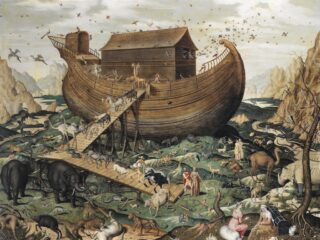Tokyo College Event “The Gothic Cathedral of Science: The Nobel Prize and the Concept of ‘Revolution’” by Prof.Svante Lindqvist
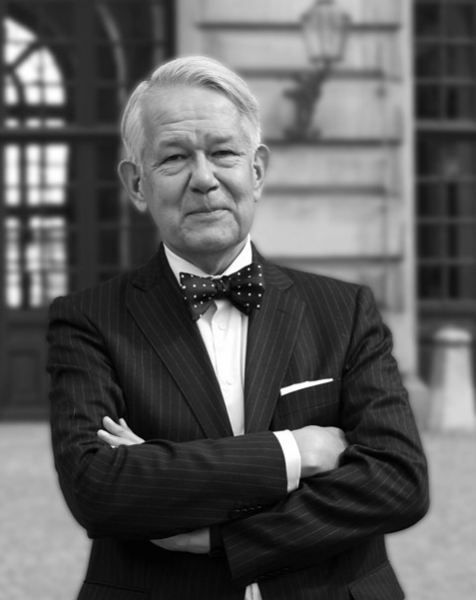
We ask Professor Svante Lindqvist, former Director of the Nobel Museum and former President of the Royal Swedish Academy of Sciences, “Has the Nobel Prize distorted our view of scientific development?”
On May 27, 2019, Professor Lindqvist gave a lecture on “The Gothic Cathedral of Science: The Nobel Prize and the Concept of Revolution’.” Professor Lindqvist talked about the “development of science” by analogy to the history of cathedral architecture, while sharing his experiences at the Royal Swedish Academy of Sciences (the institution that confers the Nobel Prize), and engaged in a three-way discussion with Professor Takaaki Kajita (Distinguished Professor at the University of Tokyo, and Director of its Institute for Cosmic Ray Research) and Professor Takuji Okamoto (Professor at Graduate School of Arts and Sciences, the University of Tokyo).
Moderator Masaki Sano (Deputy College Director) introduced the purpose of Tokyo College and of the lecture. Tokyo College is a new initiative of the University of Tokyo to consider the ideal future for humanity and the planet, together with motivated persons from around the world, and move towards realizing such a future.
What does “revolution” mean?
Professor Lindqvist explained that the Nobel Prize has been awarded for scientific “revolutions,” for which there are the following two categories: (1) discoveries that revolutionize a particular scientific discipline; and (2) discoveries whose practical implementation has brought about a revolutionary change for many individuals. He also stated that there is a difference in the meaning of the word “revolution” as used by natural scientists and as used by historians of science; in contrast to natural scientists, who use the word “revolution” casually, historians of science prefer not to use the word at all.
Sociologists of science criticize natural science as only undertaking positivist research, while natural scientists criticize sociologists of science as undertaking meaningless work. Professor Lindqvist, who undertakes research in both physics and the history of science, and who belongs to both camps, told of how he feels a dilemma in such circumstances.
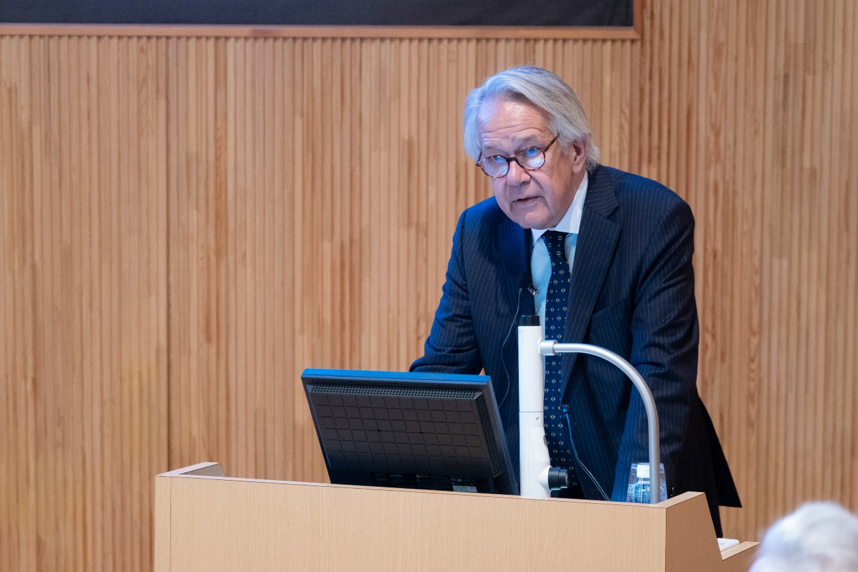
The perception gap regarding the development of scientific knowledge
Maintaining that there is a perception gap between these two camps regarding the development of scientific awareness, Professor Lindqvist said that “During the last 30 years or so, social constructivists have largely dictated the history of science, known as social constructional science. In terms of the Gothic cathedral metaphor, it is as though they are not interested in the construction and growth of this large edifice… Natural scientists, on the other hand, regard the development of scientific knowledge as the construction of a colossal cathedral, thus creating a lasting edifice block by block.”
If human life expectancy were 400 years…
At the end of the lecture, Professor Lindqvist viewed it as problematic that the history of the Nobel Prize evaluates the development of science within the short period of around 100 years since its creation, a relatively short history, as permanent truth; he stated that if we humans lived for 400 years, we might be “more modest with regard to their faith in current scientific knowledge as being eternally true.” Even cathedrals of science that seem complete are unstable constructions that eventually require rebuilding according to new laws or principles.
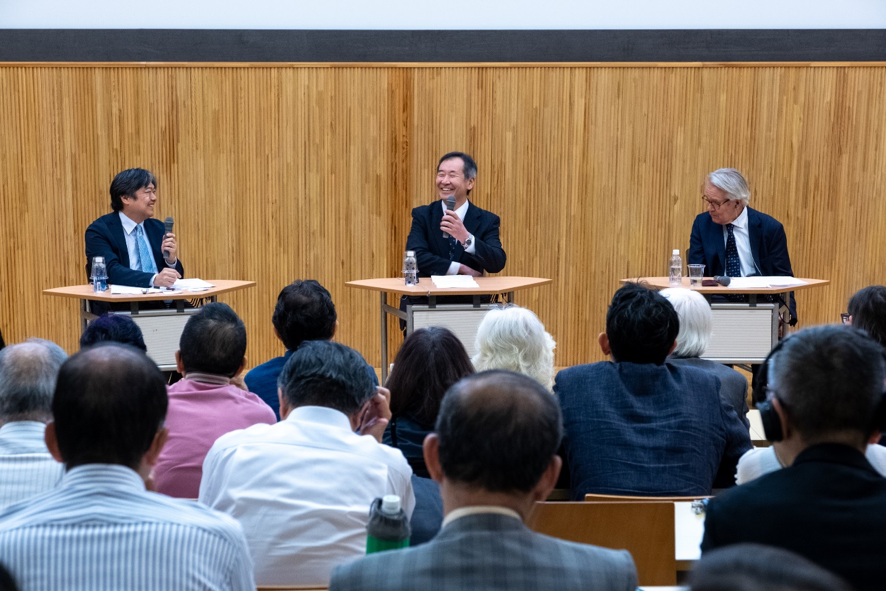
Three-way discussion
After the lecture, Professor Lindqvist was joined on the stage by Professor Takaaki Kajita and Professor Takuji Okamoto.
Professor Kajita, who won a Nobel Prize in Physics in 2015 for achieving the discovery of neutrino oscillations, which shows that neutrinos have mass, stated that “The impact of the discovery was to show that the standard model for particle physics was not perfect—that is to say, that it necessary to expand and extend the standard model in some way,” but “it is necessary to think of a better theory with reference to the current standard model.”
Furthermore, discussion continued into themes such as the reasons for the significant increase in the number of Nobel laureates in Japan in the fields of science since 2002, the fact that many Nobel laureates have been influenced by experiences and education at the age of around 12 to 13 years, and the spirit of scientists to take on challenges. Professor Kajita said that, “The environment of invention must not have a hierarchical structure. In that sense, I think that the Japanese university system still needs improvement.”
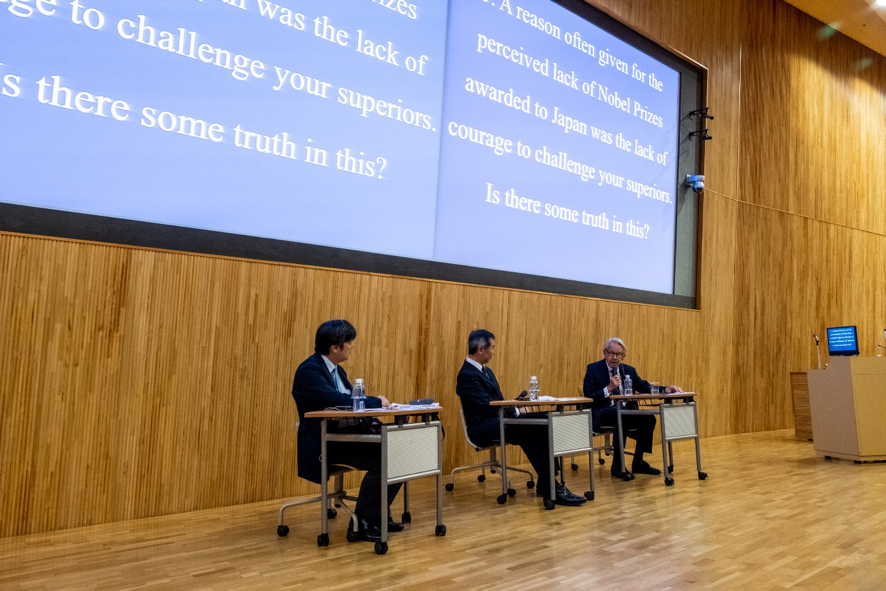
Q&A session
Many questions were raised in the question and answer session with the floor, concerning issues such as the relationship between Nobel laureates and nationality, gender balance, contributions from Asia in the process of building a cathedral of science, and the place of humanity in the “development of science.” Professor Okamoto stated that we must not forget that the efforts of all those who may not be visible, such as those not eligible for a Nobel Prize, also make possible the existence of humanity in general. On the day of the event, participants exceeding capacity came to venue, and there was an active exchange of ideas concerning the future of humanity.
| Date(s) | May 27th (Mon), 2019, 1:30-3:30pm (1:00 pm Doors Open) |
|---|---|
| Venue |
Fukutake Learning Theater, The University of Tokyo (B2 Floor, Fukutake Hall, Hongo Campus) |
| Registration | Pre-registration required (160 seats available -First come, first served) |
| Language | English and Japanese(Simultaneous translation available) |
| Organized by | Tokyo College, The University of Tokyo |
| Contact | tcevent@graffiti97.co.jp |




